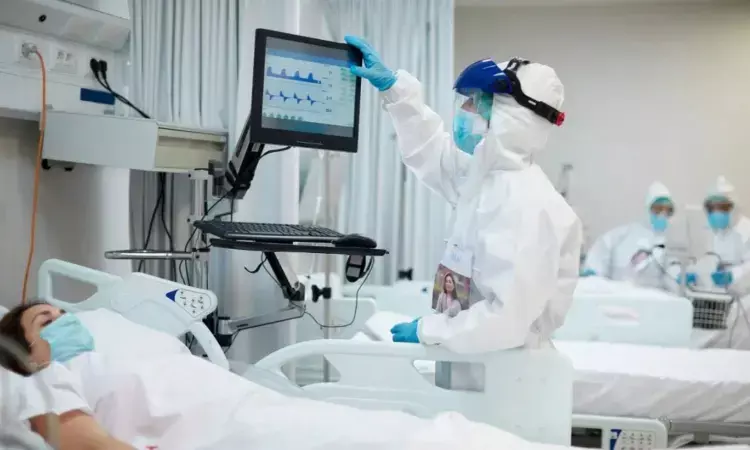- Home
- Medical news & Guidelines
- Anesthesiology
- Cardiology and CTVS
- Critical Care
- Dentistry
- Dermatology
- Diabetes and Endocrinology
- ENT
- Gastroenterology
- Medicine
- Nephrology
- Neurology
- Obstretics-Gynaecology
- Oncology
- Ophthalmology
- Orthopaedics
- Pediatrics-Neonatology
- Psychiatry
- Pulmonology
- Radiology
- Surgery
- Urology
- Laboratory Medicine
- Diet
- Nursing
- Paramedical
- Physiotherapy
- Health news
- Fact Check
- Bone Health Fact Check
- Brain Health Fact Check
- Cancer Related Fact Check
- Child Care Fact Check
- Dental and oral health fact check
- Diabetes and metabolic health fact check
- Diet and Nutrition Fact Check
- Eye and ENT Care Fact Check
- Fitness fact check
- Gut health fact check
- Heart health fact check
- Kidney health fact check
- Medical education fact check
- Men's health fact check
- Respiratory fact check
- Skin and hair care fact check
- Vaccine and Immunization fact check
- Women's health fact check
- AYUSH
- State News
- Andaman and Nicobar Islands
- Andhra Pradesh
- Arunachal Pradesh
- Assam
- Bihar
- Chandigarh
- Chattisgarh
- Dadra and Nagar Haveli
- Daman and Diu
- Delhi
- Goa
- Gujarat
- Haryana
- Himachal Pradesh
- Jammu & Kashmir
- Jharkhand
- Karnataka
- Kerala
- Ladakh
- Lakshadweep
- Madhya Pradesh
- Maharashtra
- Manipur
- Meghalaya
- Mizoram
- Nagaland
- Odisha
- Puducherry
- Punjab
- Rajasthan
- Sikkim
- Tamil Nadu
- Telangana
- Tripura
- Uttar Pradesh
- Uttrakhand
- West Bengal
- Medical Education
- Industry
IV Metoprolol safely improves oxygenation in COVID-19 patients with ARDS: Study

Spain: The administration of intravenous metoprolol in critically ill COVID-19 patients with ARDS is safe, improved oxygenation, and reduced exacerbated lung inflammation, show findings from a pilot trial.
The findings, published in the Journal of the American College of Cardiology (JACC), suggest that repurposing beta-blocker metoprolol for COVID-19-associated acute respiratory distress syndrome (ARDS) is a safe and inexpensive strategy that can reduce the burden of the COVID-19 pandemic.
Severe COVID can lead to ARDS which involves alveolar infiltration by activated neutrophils. Previous studies have shown metoprolol to improve exacerbated inflammation in the myocardial infarction setting. Agustín Clemente-Moragón, Centro Nacional de Investigaciones Cardiovasculares (CNIC), Madrid, Spain, and colleagues aimed to evaluate the effects of metoprolol on alveolar inflammation and on respiratory function in patients with COVID-19–associated ARDS.
The study included a total of 20 COVID-19 patients with ARDS on invasive mechanical ventilation. They were randomized to metoprolol (15 mg daily for 3 days) or control (no treatment). All patients underwent bronchoalveolar lavage (BAL) before and after metoprolol/control. Using invasive hemodynamic and electrocardiogram monitoring and echocardiography, the safety of metoprolol administration was evaluated.
The study yielded the following findings:
- Metoprolol administration was without side effects. At baseline, neutrophil content in BAL did not differ between groups. Conversely, patients randomized to metoprolol had significantly fewer neutrophils in BAL on day 4 (median: 14.3 neutrophils/µl [Q1, Q3: 4.63, 265 neutrophils/µl] vs median: 397 neutrophils/µl [Q1, Q3: 222, 1,346 neutrophils/µl] in the metoprolol and control groups, respectively).
- Metoprolol also reduced neutrophil extracellular traps content and other markers of lung inflammation. Oxygenation (PaO2:FiO2) significantly improved after 3 days of metoprolol treatment (median: 130 [Q1, Q3: 110, 162] vs median: 267 [Q1, Q3: 199, 298] at baseline and day 4, respectively), whereas it remained unchanged in control subjects.
- Metoprolol-treated patients spent fewer days on invasive mechanical ventilation than those in the control group (15.5 ± 7.6 vs 21.9 ± 12.6 days).
The researchers concluded, "our results show that IV administration of metoprolol to patients with severe COVID-19–associated ARDS is safe and abrogates the exacerbated lung inflammation associated with the disease."
"Reduced lung inflammation was associated with a significant improvement in oxygenation and with a trend toward fewer days on mechanical ventilation and of ICU admission," they wrote.
Reference:
The study titled, "Metoprolol in Critically Ill Patients With COVID-19," is published in the Journal of the American College of Cardiology (JACC).
DOI: https://www.jacc.org/doi/10.1016/j.jacc.2021.07.003
Dr Kamal Kant Kohli-MBBS, DTCD- a chest specialist with more than 30 years of practice and a flair for writing clinical articles, Dr Kamal Kant Kohli joined Medical Dialogues as a Chief Editor of Medical News. Besides writing articles, as an editor, he proofreads and verifies all the medical content published on Medical Dialogues including those coming from journals, studies,medical conferences,guidelines etc. Email: drkohli@medicaldialogues.in. Contact no. 011-43720751


